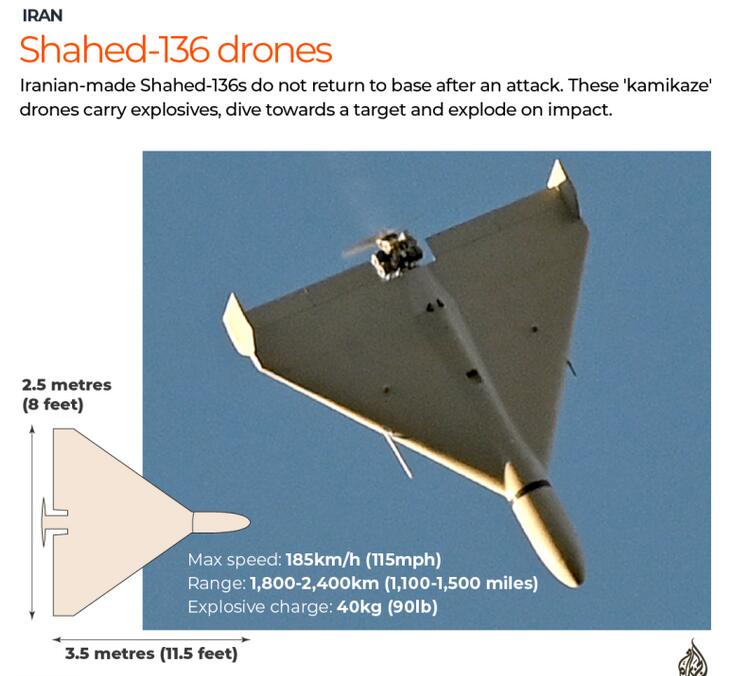Russia is planning a protracted campaign of attacks with Iranian drones to “exhaust” Ukraine, President Volodymyr Zelenskyy has said.
“We have information that Russia is planning a protracted attack using Shahed drones,” Zelenskyy said in his nightly video address. “It is probably banking on exhaustion. Exhausting our people, our anti-aircraft defences, our energy.”
Ukraine, he said, had to “act and do everything so that the terrorists’ fail in their aim, as all their others have failed”.
IMF: Half of EU to be in recession due to Ukraine war
The head of the International Monetary Fund, Kristalina Georgieva, has said that half of the 27-nation European Union will be in recession in 2023 as the bloc is “very severely hit” by the Ukraine conflict.
“We expect one-third of the world economy to be in recession,” Georgieva said.
The upcoming year will be “tougher than the year we leave behind” for the world economy, she said.
“Why? Because the three big economies, US, EU, China, are all slowing down simultaneously,” she told CBS’s Face the Nation programme.
Ukraine: Mastermind of Banksy mural removal faces jail time
The suspected mastermind behind the removal of a Banksy mural in a Ukrainian town could face up to 12 years in prison if found guilty, Ukraine’s interior ministry has said.
The artwork, depicting a woman in a gas mask and a dressing gown holding a fire extinguisher, was taken off a wall in the town of Hostomel on December 2, according to officials.
The artwork by the renowned British artist had been valued at more than 9 million hryvnia ($243,900), the ministry statement said.
The mural was retrieved.
Banksy confirmed he had painted the mural and six others in places that were hit by heavy fighting after Russia invaded Ukraine in late February.
French engineering group halts activities in Russia due to EU sanctions
French engineering group Gaztransport & Technigaz (GTT) has said it is stopping its activities in Russia after analysing the latest European sanctions packages, which include a ban on engineering services with Russian firms.
The group said its contract with Russian shipbuilding company Zvezda for 15 ice-breaking liquefied natural gas (LNG) carriers would be suspended as of January 8 and activities limited on the two most advanced ones.
Attack on Moscow’s troops in Makiivka is retaliation for wave of Russian assaults: Analyst
Samuel Ramani, an international relations specialist at the University of Oxford in the United Kingdom, said the latest attack by Kyiv on Russian troops in Makiivka was done in retaliation for assaults on Ukraine.
“Ukraine was answering to the wave of missile and drone strikes that occurred in the capital against civilian infrastructure on either side of the New Year,” Ramani told Al Jazeera.
“And Ukraine could have responded by striking Russian territory again like it did at Engels around Christmas time or responded by striking targets inside Donbas like it has done repeatedly.”
Ramani said that Makiivka “is a stronghold for Russian conscripts” and noted that “typically attacks of this nature in Popasna and other parts of the front line were targeting wider mercenaries.”
Russia said on Monday that 63 Russian soldiers had been killed in a Ukrainian New Year’s Eve attack on their quarters.
Ramani told Al Jazeera that it is unusual for Russia to admit to suffering casualties.
“When it does talk about casualties it talks about them in broad, generic terms, like heavy losses. It doesn’t go out into exact numbers. An admission to this level of casualties in either Syria or Ukraine is quite unique,” he said.
Kyiv claims responsibility for Makiivka attack
Ukraine has claimed responsibility for an attack on Russian forces in the occupied eastern town of Makiivka, which, according to the Russian defence ministry, killed 63 soldiers.
“On December 31, up to 10 units of enemy military equipment of various types were destroyed and damaged” in Makiivka in the Donetsk region, the General Staff of the Ukrainian Armed Forces said in a statement.
It said the number of Russian dead was still being established.
European gas prices fall to their lowest level since war began
Europe’s wholesale natural gas prices have fallen to their lowest level since Russia invaded Ukraine 10 months ago and drove gas prices to a record high.
Prices dropped to 73 euros ($78) per megawatt hour on Monday, 50 percent lower than a month ago and a fraction of the record 342 euros ($364) reached in March.
Gas exports by the Russian energy giant Gazprom to the European Union and Switzerland fell by 55 percent last year because of sanctions on Russia.
European nations feared Russia could cut off gas supplies, so they filled up their gas storage tanks and encouraged consumers to save on energy during the winter. European storage levels are at 83 percent capacity, reducing the need to buy more gas.
EU nations have also adopted a cap on natural gas prices, but analysts say it will likely have a limited impact on what businesses and households pay.

